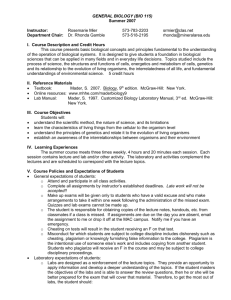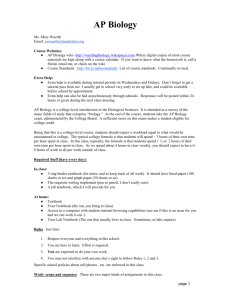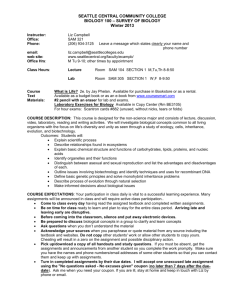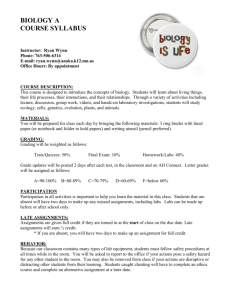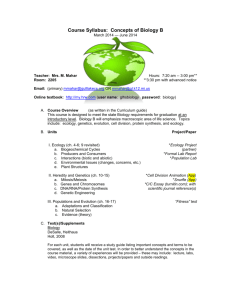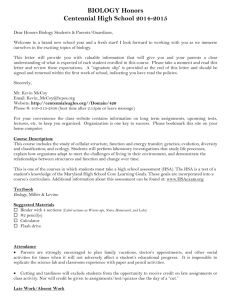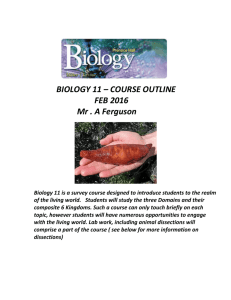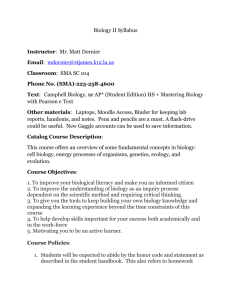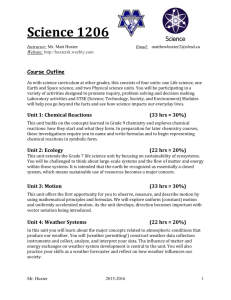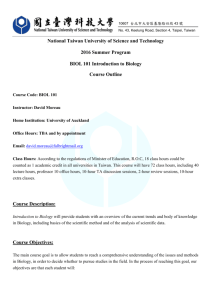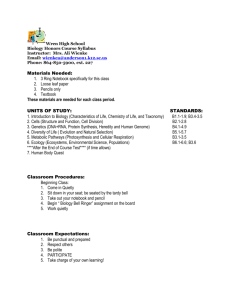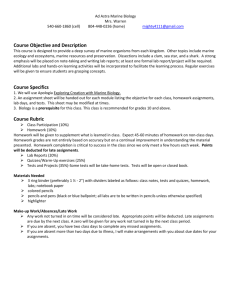general biology (bio 115)
advertisement
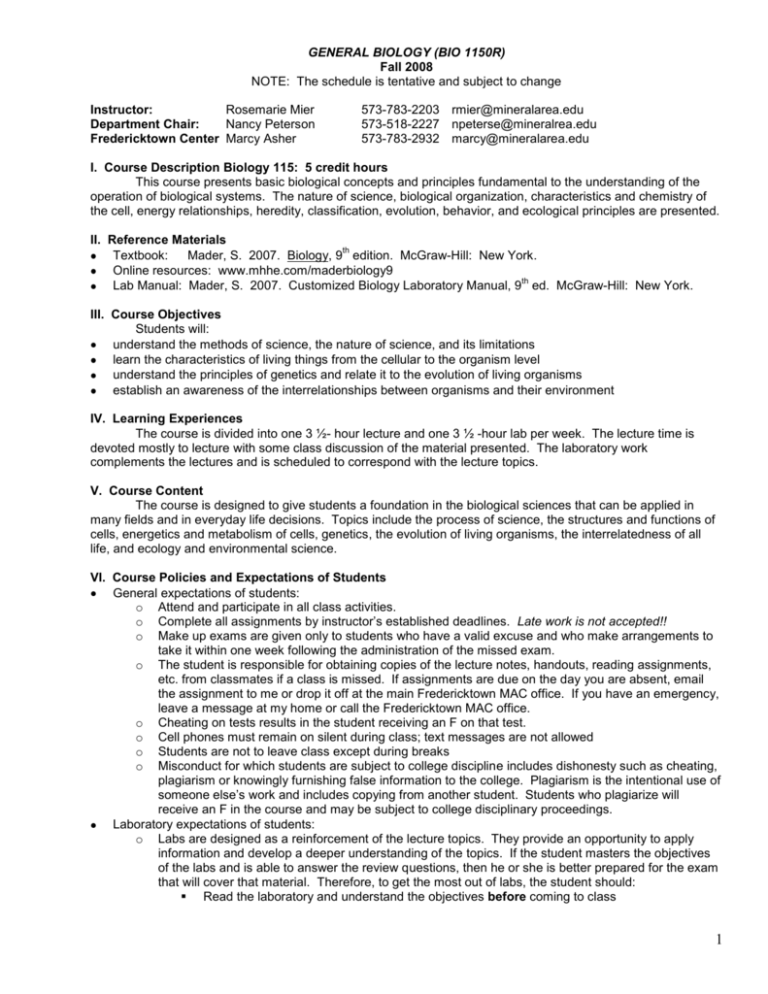
GENERAL BIOLOGY (BIO 1150R) Fall 2008 NOTE: The schedule is tentative and subject to change Instructor: Rosemarie Mier Department Chair: Nancy Peterson Fredericktown Center Marcy Asher 573-783-2203 rmier@mineralarea.edu 573-518-2227 npeterse@mineralrea.edu 573-783-2932 marcy@mineralarea.edu I. Course Description Biology 115: 5 credit hours This course presents basic biological concepts and principles fundamental to the understanding of the operation of biological systems. The nature of science, biological organization, characteristics and chemistry of the cell, energy relationships, heredity, classification, evolution, behavior, and ecological principles are presented. II. Reference Materials th Textbook: Mader, S. 2007. Biology, 9 edition. McGraw-Hill: New York. Online resources: www.mhhe.com/maderbiology9 th Lab Manual: Mader, S. 2007. Customized Biology Laboratory Manual, 9 ed. McGraw-Hill: New York. III. Course Objectives Students will: understand the methods of science, the nature of science, and its limitations learn the characteristics of living things from the cellular to the organism level understand the principles of genetics and relate it to the evolution of living organisms establish an awareness of the interrelationships between organisms and their environment IV. Learning Experiences The course is divided into one 3 ½- hour lecture and one 3 ½ -hour lab per week. The lecture time is devoted mostly to lecture with some class discussion of the material presented. The laboratory work complements the lectures and is scheduled to correspond with the lecture topics. V. Course Content The course is designed to give students a foundation in the biological sciences that can be applied in many fields and in everyday life decisions. Topics include the process of science, the structures and functions of cells, energetics and metabolism of cells, genetics, the evolution of living organisms, the interrelatedness of all life, and ecology and environmental science. VI. Course Policies and Expectations of Students General expectations of students: o Attend and participate in all class activities. o Complete all assignments by instructor‟s established deadlines. Late work is not accepted!! o Make up exams are given only to students who have a valid excuse and who make arrangements to take it within one week following the administration of the missed exam. o The student is responsible for obtaining copies of the lecture notes, handouts, reading assignments, etc. from classmates if a class is missed. If assignments are due on the day you are absent, email the assignment to me or drop it off at the main Fredericktown MAC office. If you have an emergency, leave a message at my home or call the Fredericktown MAC office. o Cheating on tests results in the student receiving an F on that test. o Cell phones must remain on silent during class; text messages are not allowed o Students are not to leave class except during breaks o Misconduct for which students are subject to college discipline includes dishonesty such as cheating, plagiarism or knowingly furnishing false information to the college. Plagiarism is the intentional use of someone else‟s work and includes copying from another student. Students who plagiarize will receive an F in the course and may be subject to college disciplinary proceedings. Laboratory expectations of students: o Labs are designed as a reinforcement of the lecture topics. They provide an opportunity to apply information and develop a deeper understanding of the topics. If the student masters the objectives of the labs and is able to answer the review questions, then he or she is better prepared for the exam that will cover that material. Therefore, to get the most out of labs, the student should: Read the laboratory and understand the objectives before coming to class 1 During the lab, work equally in groups, discuss problems, and ask questions. Each student is to complete all laboratory procedures. Formulate your own answers to questions before checking with others. o Labs are scheduled for 3 hours and 20 minutes. Plan to remain for the entire session, helping other students and with clean-up if you finish early; reviews are at the end of the lab period o Notify the instructor if you have a reason to miss a lab. There are no makeups due to the inconvenience in setting up labs, but you may complete an assignment in lieu of one lab only. Attendance o Students missing three consecutive classes will be dropped from the course. o Except under exceptional circumstances, students missing more than any two sessions will have their course grade reduced by a letter grade for each session missed beyond two. Coming late or leaving early will count for ½ session. VII. Evaluation Mineral Area College employs a five-level grading system using the letters A, B, C, D, F, W, I, H and P. o A (90-100%) Superior work D (60-69%) Below average work o B (80-89%) Above average F (less than 60%) Work is undeserving of credit o C (70-79%) Average work W Withdrew from course Vocabulary Quizzes 13 at 10 pts. each, 3 lowest dropped Miscellaneous assignments 100 pts. Current events summaries 7 @ 10 points each 70 Lab Participation 14 @ 10 pts, drop lowest 130 Lecture exams 4 at 100 points each Comprehensive final 400 100 100 VIII. Assignments/Assessments In the News Write a summary of a current (within 6 months) news article or web page that is related to biology. If you are absent on the day it is due, email or take it to the Fredericktown MAC office on the day it is due. Use the “In the News” guideline sheet. Laboratory The lab manual questions and review are designed to help you master the objectives of the lab. Complete the worksheets during the lab, and then complete the lab review as a study guide. The study guide is discussed at the end of the lab or at the beginning of the next class meeting. The unit lecture exams include material from the lab review sheets. You receive points for completing the lab, so if you miss a lab, ask for an alternate assignment (NOTE: only one lab may be “made up” with an alternate assignment). Lecture Lecture exams are a mixture of multiple choice, fill-in-the blank, identification, short answer, and essay questions, and include material from the labs. The final exam is comprehensive of all chapters covered, except those on the last lecture exam. Quizzes are over vocabulary for each chapter and are given at the start of lecture. IX. Disability Policy The Rehabilitation Act of 1971 (Public Law 93-112), Section 504, provides that „no otherwise qualified handicapped individual in the United States shall, solely by reason of handicap, be excluded from the participation in, be denied the benefits of, or be subjected to discrimination under any program of activity receiving federal financial assistance.” “Section 504 applies to postsecondary education programs and activities. It designates that . . . academic requirements must be modified, on a case-by-case basis, to afford qualified students with disabilities an equal educational opportunity.” (“Disability Accommodation Handbook,” Mineral Area College: 2) Students who have special needs as addressed by the Americans with Disabilities Act should notify me so reasonable accommodations may be made. 2
